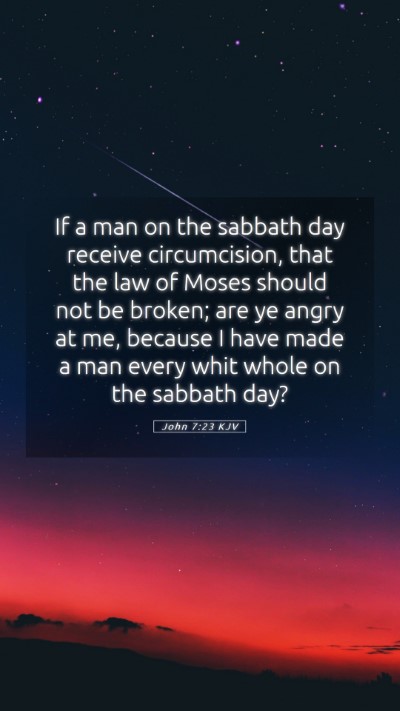In-depth Analysis of John 7:23
John 7:23 states:
"If a man on the Sabbath receive circumcision, that the law of Moses should not be broken; are ye angry at me, because I have made a man every whit whole on the sabbath day?"
Summary of the Verse
This verse highlights a crucial conversation Jesus has with the Jewish leaders regarding the laws of the Sabbath, emphasizing the conflict between rigid adherence to the law and the spirit of compassion and healing that Jesus embodies. It serves to question their understanding and application of the law, particularly in the context of mercy and healing.
Insights from Commentary
Matthew Henry's Commentary
Matthew Henry discusses the inconsistency of the Jewish leaders, who would permit circumcision on the Sabbath, yet condemn Jesus for healing a man. Henry illustrates the hypocrisy in their legalism, suggesting that they prioritized tradition over humanity. By making this point, Jesus challenges their authority and urges them to reconsider their strict interpretations of the law.
Albert Barnes' Commentary
Barnes emphasizes the importance of understanding the law's true intent, which is to promote life and well-being. He notes that Jesus points to the greater principle that mercy takes precedence over sacrifices. Barnes argues that if the leaders could justify a surgical procedure on a day meant for rest, they should also accept acts of healing and restoration, which signify God's love and care for His creation.
Adam Clarke's Commentary
Clarke expounds on the cultural implications of the Sabbath laws and their interpretations by the religious leaders. He highlights how this verse points to a radical approach to understanding God's commands, as Jesus illustrates that the spirit of the law should rule over the letter. Clarke's insight emphasizes the transformative message of Jesus, urging believers to embody compassion and actively uphold the values of the Kingdom of God.
Key Themes of John 7:23
- Legalism vs. Compassion: The tension between rigid adherence to the law and acts of kindness.
- Authority of Jesus: Jesus challenges established norms and authorities through His actions.
- Healing on the Sabbath: Showcases Jesus’ mission to heal, even when it contradicts societal expectations.
- Reflection on the Law: Encourages a deeper understanding of scriptural commands beyond face value.
Application of John 7:23
For modern readers, this verse invites reflection on how one interprets and applies spiritual laws in daily life. It encourages questioning whether practices and traditions enhance or hinder acts of compassion. As believers engage in Bible study groups or participate in online Bible study, they are challenged to examine their motivations and the implications of their actions within faith communities.
Furthermore, understanding this scripture may inspire discussions in Bible study lessons focused on mercy over legalism and how to embody Jesus’ teachings in everyday interactions.
Cross References
- Matthew 12:12: Advocates for doing good on the Sabbath.
- Luke 13:15: Jesus reprimands the Pharisees about their views on the Sabbath.
- Mark 3:4: Another account of Jesus healing on the Sabbath, posing a similar question to the religious leaders.
Conclusion
John 7:23 serves as a profound lesson in Biblical exegesis. It encourages believers to explore the meanings behind the law and invites them into a living relationship with scripture that prioritizes love and healing. By studying this passage, we gain Bible study insights that resonate with our experiences of law and grace, ultimately turning our focus towards a more compassionate application of God’s commands.
Engaging with such texts can deepen one's understanding of Scripture and foster an environment where faith is expressed through action and mercy.


